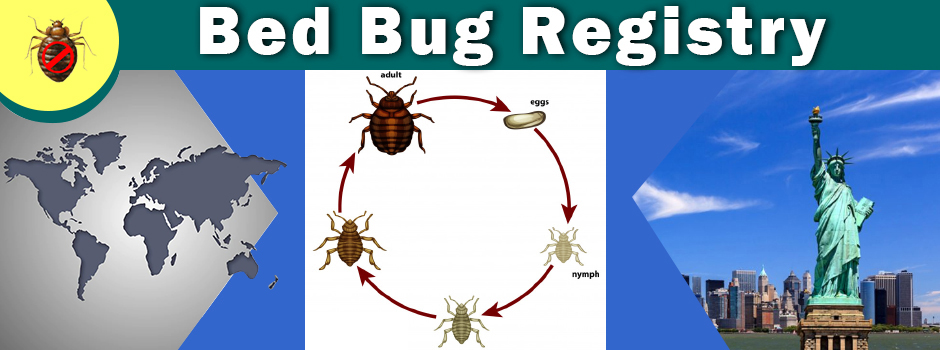What are bed bugs?
Bed bugs are small wingless insects that feed upon the blood of warm-blooded animals, such as humans, birds, rodents, bats and pets.
Young bed bugs are about the size of a poppy seed and adults are about a 1/4 inch long. Their bodies are oval and flat and their color ranges from nearly white (after molting) to deep brown (after feeding).
Bed bugs live in cracks and crevices and only come out at night to feed.
Do bed bugs spread disease?
Bed bugs are not known to spread disease.
Bed bugs inject a small amount of saliva into the skin while feeding. An allergic reaction to the saliva may cause the area around the bite to become swollen and itchy. Do not scratch bites, as this may worsen the irritation and itching and may lead to a secondary infection.
Why are bed bugs resurging?
International travel and changes in modern pest control practices are believed to be responsible for the resurgence of bed bugs in the United States.
Bed bugs are common in Asia, Africa, Central and South America and Europe. With the growth of international travel, bed bug infestations are steadily increasing. Since most people of this generation have never seen a bed bug, they are more likely to bring bed bugs home with them in luggage and on clothes.
In the 1940s and 50s, the pesticide DDT was liberally used in homes to fight insect infestation. With the ban on DDT in the 1970s pest control methods changed from elimination to repellent and baits. These changes make it easy for bed bugs to avoid most pest control methods.
How can I avoid bed bugs while traveling?
Check for bed bugs right after entering your hotel room.
What if I think my hotel room has bed bugs?
Most good hotels have a plan in place to deal with bed bug infestations. If you believe a room is infested with bed bugs, notify the front desk immediately. You will most likely be moved to another room.
Notify the Southern Nevada Health Districts Environmental Health Division at (702) 759-0588 to report the infestation.
To prevent bringing the bed bugs with you to the new room, have clothes washed in hot water and dried in a commercial dryer for one hour and store luggage in a sealed plastic bag.
How do I prevent bringing bed bugs home with me?
If you have visited a dwelling infested with bed bugs, the following procedures will help prevent you from bringing the pests home.
What if I think my home has bed bugs?
If you suspect a bed bug problem in your home, look for these signs:
Be aware that other insects, such as fleas, ticks and mosquitoes, can leave bites that look like bed bug bites. Bites alone cannot prove you have a bed bug infestation.
Additionally, several different kinds of insects resemble bed bugs, so any bugs found in your home should be carefully compared to pictures to confirm their identify. A pest control expert or entomologist can also accurately identify the insects you collect.
Once you have confirmed the presence of bed bugs, devise a plan to rid them from your home.
There are several things you can do to rid bed bugs from your home:
How did bed bugs get into my home?
Bed bugs come out at night and hide in the presence of light. Their size and shape make it easy for them to hide:
Bed bugs are efficient hitchhikers and are usually transported home on luggage, clothing, beds, furniture, etc. Travelers returning from countries where bed bugs are common bring bed bugs home in their luggage or clothes. Buying secondhand furniture is another way bed bugs can enter your home.
The cleanliness of the dwelling has little to do with the level of bed bug infestation. Bed bugs will thrive in any location where there are warm-blooded hosts and plenty of hiding places.
What are the rights and obligations of tenants and landlords?
Renters: Landlords and property owners have an obligation to provide safe and habitable accommodations for tenants. Tenants have an obligation to cooperate with owners and landlords. This includes preparing the home so that the pest control operator can easily inspect the rooms and treat if necessary. Visit the Landlord/Tenant Hotline webpage for more details.
Landlords: Landlords and property owners have an obligation to provide safe and habitable accommodations for tenants. Bed bug infestations can be considered unacceptable conditions.
Because bed bugs can live for months without feeding, they may be present in clean and vacant homes. Bed bugs can move between apartments through voids in walls and holes through which wires and pipes pass.
For more information on the rights and obligations of tenants and landlords, visit the Nevada Revised Statutes Chapter 118A Landlord and Tenant: Dwellings webpage.
Reporting a Bed Bug Problem in a Rental Unit
Visit the Landlord/Tenant Hotline webpage for reporting instructions. Do not come to the health district in person to submit a complaint. You may have bed bugs on your clothing or skin, which poses a risk of spreading the pests to other clients and staff.
Quick Facts
Read this article:
Bed Bugs Southern Nevada Health District

 Residence
Residence  Location
Location 










